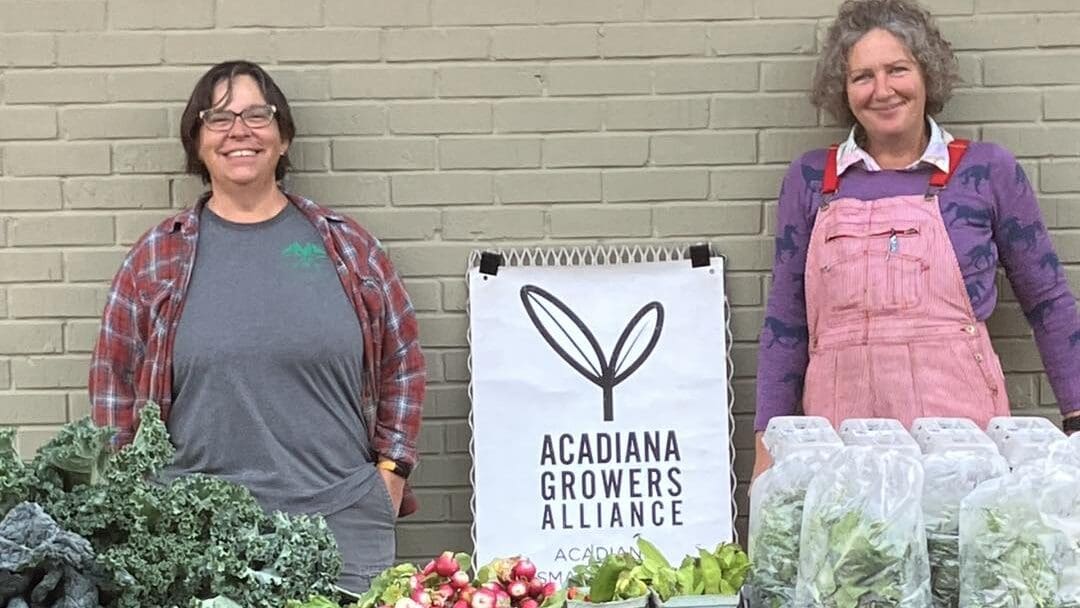When the Acadiana Growers Alliance (AGA) was founded in 2015, it grew from a simple belief: that everyone in southern Louisiana should have access to locally grown food — and that small family farms deserve the support they need to thrive.
The idea emerged from a two-year initiative funded by the Blue Cross Blue Shield Foundation, which focused on community gardens and food education in Iberia Parish, focusing on low-income, low-access areas.
“When that program wrapped up, AGA was created to carry that work forward,” AGA Executive Director Jennie Lallande said.
“Our mission then, and still today, is to educate and create access across the local food system — from eaters to growers — and to strengthen connections throughout our community.”
Today, AGA serves nine parishes in the Acadiana region, offering aggregation, distribution, and technical assistance to small farms, many of them micro-operations earning under $250,000 a year. But their work goes far beyond logistics.
As Lallande put it:
“We also provide a lot of emotional support. Farming can be tough, especially for beginners, so we schedule volunteer workdays where groups can come together and tackle large projects — building beds, construction, you name it — often in just a few hours.”

“I’ve worked in local food systems since 2013, and I’ve seen many beautiful family farms shut down and return to traditional 9-to-5 jobs,” added Lallande. “Every one of those closures means food no longer being grown and eaten in our own community. That’s what motivates us — supporting small family farms so they can stay in business.”
A Region Ready to Grow — and a Funding Gap
The Alliance recently secured a reimbursable grant through the USDA’s Resilient Food Systems Infrastructure (RFSI) program — a step forward for their producers. The award will fund infrastructure including two commercial walk-in coolers and two full wash-and-pack stations (sinks, shelving, faucets, sanitizing space).
One equipment set will be installed at AGA’s New Iberia headquarters; the other will be placed at a partner farm 40 miles north, expanding cold storage and processing access for small farms that don’t have their own have commercial-grade sinks or cooling.
The new additions will enable AGA to launch a refrigerated van program that will run between both cold-storage locations, picking up and dropping off product.

But there was one challenge: RFSI awards are reimbursable, and actual federal reimbursements can take months — in AGA’s case, nearly 18 months. Jennie knew that waiting could stall the entire project, preventing farmers from accessing equipment before the next growing season.
How Communities Unlimited Stepped In
The Lending Team at Communities Unlimited (CU) recognizes the urgency small-scall farmers face in the current economic conditions and created a bridge loan program for RFSI awardees, allowing them to purchase the equipment immediately instead of leaving growers to sacrifice precious time waiting on funds to pay out – time that many don’t have in an industry where time is crucial.
AGA found out about the program and connected with CU Economic Development Loan Officer Candence Brooks who guided them through the process, becoming a trusted partner throughout.
“Oh my gosh — wonderful,” Jennie said about her experience working with Brooks. “We are not financial wizards. We’re a team of women farmers, and we’re still growing as businesspeople. Candence was so patient, sympathetic, and generous with her time.”
“She walked us through every step of the process and made sure we understood everything. She essentially held our hand the whole way, and we’re so grateful for that.”
The bridge financing was designed to be repaid once the federal reimbursement arrives, but it gave AGA the freedom to move without delay — keeping their momentum strong at a time when many nonprofits might have had to pause operations. The CU loan for Acadiana is thanks to the ongoing support of the Sachs Family Foundation.
“I love what Acadiana Growers Alliance is doing in their community,” Brooks said. “Having access to fresh produce is important to not only the consumers, but also small farmers who provide the product. The bridge funding that we provided will allow them to purchase much-needed equipment to strengthen their operations and reach more people.”
In an environment where confidence in reimbursable federal contracts is low, CU’s willingness to take a risk mattered.
“The fact that CU was willing to step in so we could get this equipment means a lot,” Jennie said. “It’s allowing us to keep moving forward when we otherwise couldn’t.”
What Comes Next for AGA
The equipment is already on its way. The walk-in coolers are scheduled to ship December 26, and the wash-and-pack systems are arriving by the end of November. Once everything is in place, AGA will launch a new distribution chain for local farms through their refrigerated van, connecting growers across the region to storage, processing, and markets.

More importantly, the region’s small farms — many of them family-run, volunteer-supported, and community-rooted — will gain the resources they need to stay in business.
Jennie is looking ahead with excitement:
“I can’t wait to see how this impacts food production and food access in our community. This is going to grow our support network and strengthen our entire local food system.”
A Partnership That Keeps Food Local
Acadiana Growers Alliance represents 24 small family farms, and that number grows each year. Through training, community engagement, cooperative marketing, and shared infrastructure, they are demonstrating what is possible when small farms have the support they need.
By bridging a funding gap, CU helped ensure AGA could move forward — not months later, but right now, when the community needs them most.

